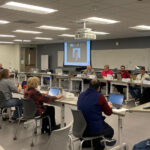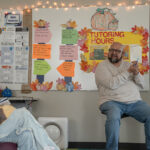Students who identify themselves as gender sexual romantic minorities (GSRM) now have the opportunity to attend the university’s Safe Zone program, a workshop that provides a confidential setting for student, faculty and staff to learn and embrace individual labels and terminology.
Texas A&M University-San Antonio launched a Safe Zone training this fall to educate students, faculty and staff about individuals who consider themselves GSRM. GSRM is the term favored over the commonly-used LGBT because it reaches a broader audience. The program is modeled after Safe Zone programs at college campuses across the U.S. “committed to developing and nurturing a safe space for all students,” according to the facilitator guidebook.
The first of two training sessions this semester, aimed at combating homophobia and heterosexism, took place on Sept. 14 in Central Academic Building, Room 219.
“We’re hoping to be able to extend the program to specific groups for future workshops,” said Katherine Gillen, assistant professor of English.
Members of the Safe Zone Task Force include Melissa Mahan, vice president for student affairs, several faculty and staff, and three student members.
During these confidential trainings, individuals are encouraged to share their experiences or background with sexual identity. Participants perform hands-on activities to ensure proper training and understanding of such sensitive subjects.
“The activities are a sobering experience that will pull at you emotionally,” said Liz Chavez, case manager-student support services coordinator.
To become a personal Safe Zone at A&M-San Antonio, individuals need to participate in a Safe Zone Training Session offered by Student Counseling and Wellness Services during the academic year.
Professors who attended the training said they want to be able to provide a welcoming classroom to all students. Students are encouraged to attend the last workshop of this semester on Oct. 13 at the Brooks City-Base Campus.
For more information, call the university’s Office of Student Counseling & Wellness Services at (210) 784-1331 or email SafeZone@tamusa.tamus.edu.






